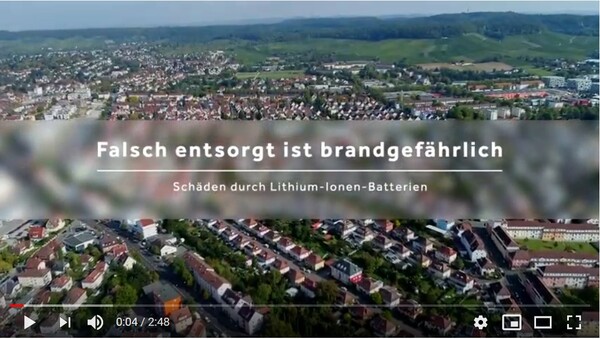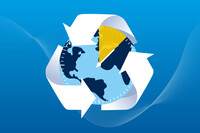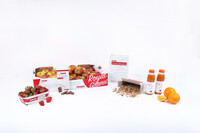Interseroh joins forces with the BDE to ensure the proper disposal of lithium-ion batteries
Environmental services provider Interseroh has teamed up with the BDE (Federation of the German Waste, Water and Raw Materials Management Industry) to launch the „Batteries: a hot topic“ campaign, which aims to raise awareness about how to dispose of lithium-ion (rechargeable) batteries. An informative video, an eye-catching social media presence and stickers will all be used to emphasise the importance of proper disposal for human health and the environment. The aim is to get the stickers onto as many waste bins as possible to warn people about the dangers of throwing batteries away like normal waste.
The idea for the campaign arose from the fact that the lithium-ion batteries now found in everything from smartphones and laptops to cordless screwdrivers, digital cameras or even e-bikes, are often thrown away into normal waste bins. This not only means valuable resources are lost but also creates very dangerous situations for people working at sorting plants or on refuse collection trucks operated by waste management companies. If damaged, these batteries can catch fire and rapidly generate temperatures of over 1,000 °C.
Markus Müller-Drexel, Managing Director of INTERSEROH Dienstleistungs GmbH: “Lithium-ion batteries must not be thrown away in household waste or the ‘yellow bag’ but collected instead in the battery collection boxes provided by high street retailers for separate disposal. Our campaign aims to inform the general public about the importance of proper disposal and raise awareness of the problem.” As a dual system operator, Interseroh is responsible for the collection, sorting and recycling of waste in Germany.
Alongside consumers, battery makers and distributors such as electrical goods manufacturers or bike repair shops must also comply with applicable legislation. These regulations mean that old (rechargeable) batteries must be taken back free of charge, safely transported and then properly managed to return them back into the loop. Hazardous goods legislation also requires everyone involved in the take-back process to complete an annual training course.
Interseroh subsidiary SIMPLi RETURN GmbH offers a range of training courses covering safe transportation and shipping, and also issues participation certificates. Further details: https://www.simplireturn.com/seminar-anmeldung/
On 25 August 2020, a free online seminar held in German entitled „Recycling von Lithium-Ionen-Batterien - das ist zu beachten!“ (‘Lithium-ion battery recycling: what you need to know’) will introduce attendees to the professional battery recycling process while also discussing good practice for handling lithium-ion batteries. Further details: https://www.xing.com/events/recycling-lithium-ionen-batterien-beachten-3010071
Watch the Youtube video: Video ansehen




